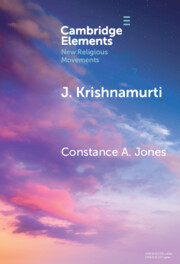Refine search
Actions for selected content:
2 results

J. Krishnamurti
- Self-Inquiry, Awakening, and Transformation
-
- Published online:
- 28 February 2025
- Print publication:
- 27 February 2025
-
- Element
- Export citation
Chapter 3 - Moral and Personal Positive Freedom
-
-
- Book:
- Positive Freedom
- Published online:
- 03 September 2021
- Print publication:
- 16 September 2021, pp 45-64
-
- Chapter
- Export citation
